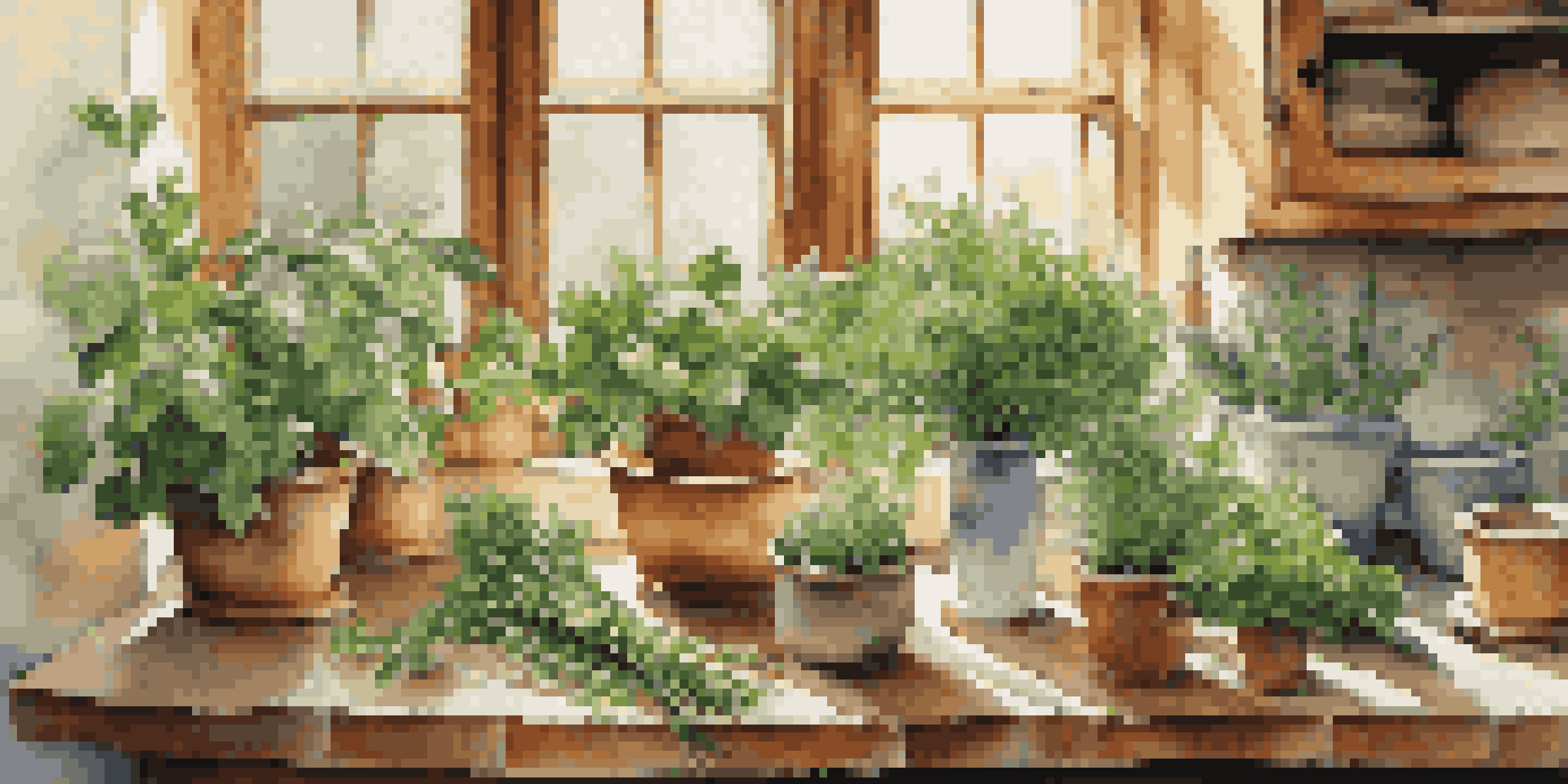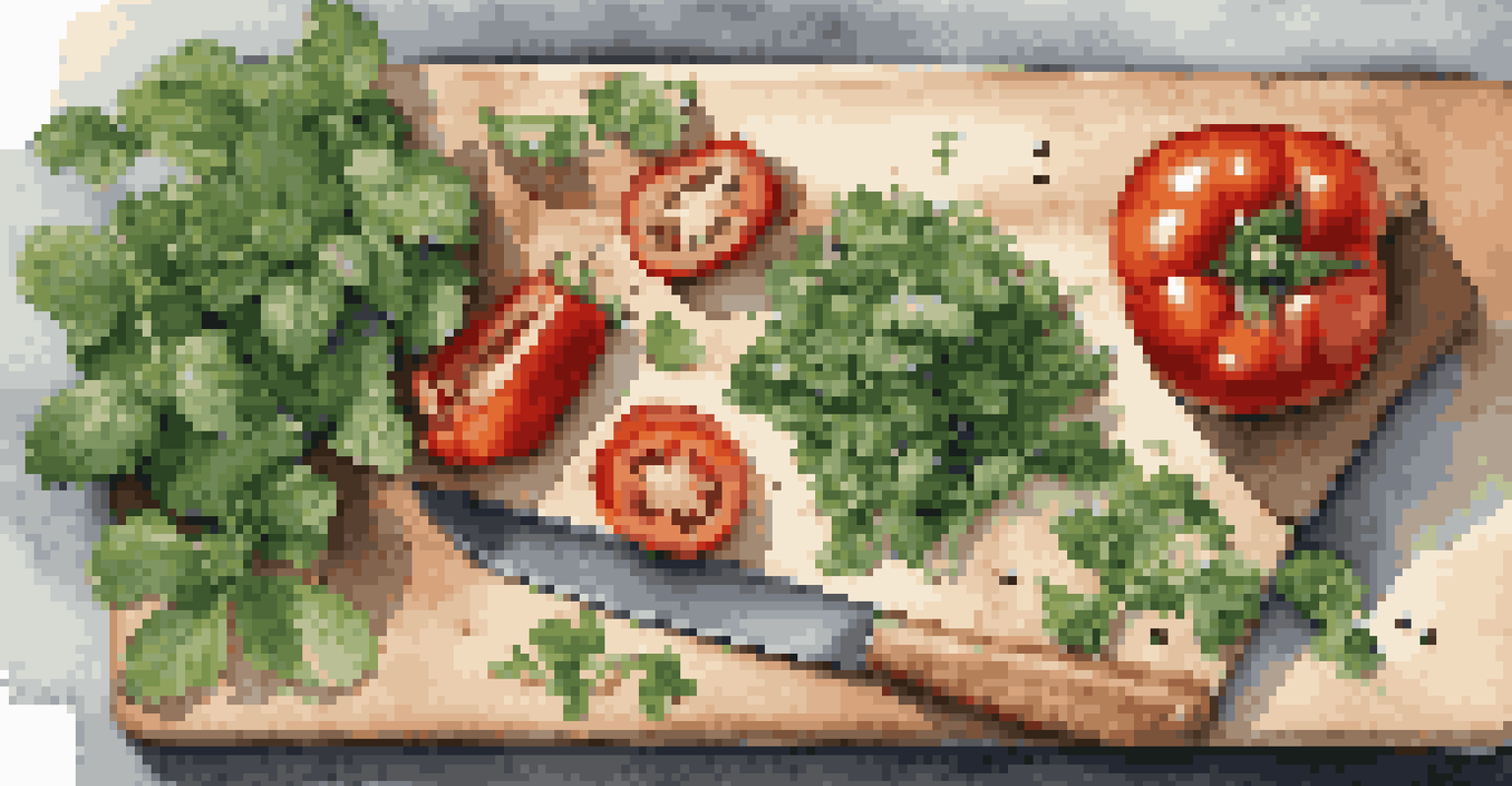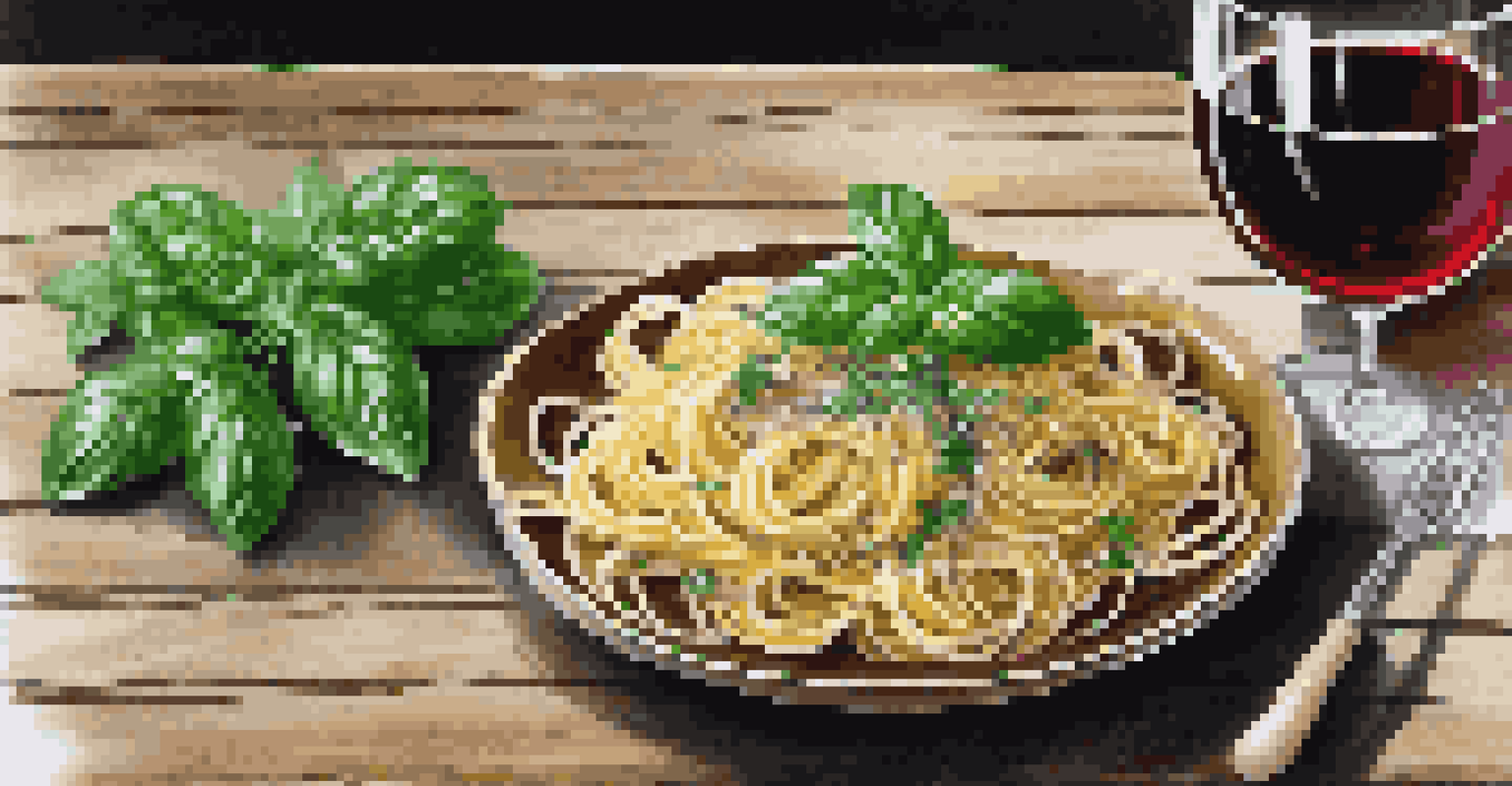Herbs and Cooking Techniques: Pairing for Success

Understanding the Role of Herbs in Cooking
Herbs are more than just a garnish; they are flavor powerhouses that can elevate any dish. From the fresh, bright notes of basil to the earthy depth of rosemary, each herb has its unique profile that can enhance your meals. Understanding how herbs work is crucial for any aspiring chef looking to create memorable flavors.
Cooking is like love; it should be entered into with abandon or not at all.
When used correctly, herbs can transform a simple dish into something extraordinary. For instance, a sprinkle of fresh parsley can brighten a heavy pasta dish, while a dash of thyme can add warmth to roasted vegetables. The key lies in knowing which herbs complement your ingredients.
Moreover, different herbs can evoke various moods and themes in your cooking. Italian dishes often highlight basil and oregano, while cilantro is a staple in many Asian and Mexican cuisines. By grasping the role of herbs, you're one step closer to mastering your culinary creations.
Choosing the Right Herbs for Your Dishes
Selecting the right herbs can make or break a dish. Fresh herbs generally provide a more vibrant flavor compared to dried ones, which can offer a concentrated essence. For example, fresh thyme can impart a subtle earthiness, while dried thyme delivers a stronger taste.

It's also important to consider the seasonality of herbs. Using fresh, in-season herbs not only enhances flavor but also supports local agriculture. For instance, during summer, you might find an abundance of fresh basil, perfect for a Caprese salad or homemade pesto.
Herbs Enhance Flavor Profiles
Understanding how to use herbs can elevate your dishes by adding unique flavors that complement your ingredients.
Lastly, think about the cooking method when choosing your herbs. Some herbs, like dill and parsley, are best added at the end of cooking to retain their fresh flavor, while sturdier herbs like rosemary can withstand longer cooking times. This consideration can significantly impact the final taste of your dish.
Exploring Cooking Techniques that Enhance Herbs
The way you cook can significantly impact how herbs taste in your dish. Techniques like sautéing or grilling can release essential oils from herbs, intensifying their flavors. For example, sautéing garlic with fresh basil creates a fragrant base for sauces or soups.
Herbs are the spice of life.
Alternatively, some herbs thrive in cold dishes. Chopped mint in a fresh fruit salad or a sprinkle of cilantro on a salsa can add refreshing notes without any cooking required. Understanding when to use your herbs can help you draw out the best flavors.
Experimenting with different cooking methods can be a delightful journey. Try roasting vegetables with rosemary or infusing oils with garlic and thyme. Each technique can unlock new dimensions of flavor, making your dishes more exciting.
The Art of Balancing Flavors with Herbs
Balancing flavors is crucial in cooking, and herbs play a key role in this harmony. When adding herbs, consider the overall flavor profile of your dish. If you're working with rich ingredients like cream or cheese, a sharp herb like arugula can cut through the heaviness beautifully.
On the other hand, if your dish is already vibrant, like a citrus salad, you might opt for milder herbs such as chives or tarragon to avoid overpowering it. This balance creates a more rounded flavor experience that delights the palate.
Quality Matters in Herbs
Using fresh, high-quality herbs significantly impacts the taste and visual appeal of your meals.
An example of this balance is in a classic chimichurri sauce, where the sharpness of parsley and garlic is balanced with the acidity of vinegar. Understanding how to balance flavors will elevate your cooking and impress your guests.
The Impact of Herb Quality on Cooking
The quality of herbs can drastically affect the outcome of your dish. Fresh herbs, ideally picked just before use, have vibrant colors and aromatic scents that dried herbs often lack. Investing in high-quality herbs can enhance the overall flavor and visual appeal of your meals.
When selecting herbs, look for those that are fragrant and free from wilting or yellowing. Organic options often provide richer flavors, as they are grown without synthetic chemicals. A small herb garden at home can also ensure you have fresh herbs at your fingertips.
Moreover, using quality herbs can inspire creativity in the kitchen. The rich flavor of fresh basil can spark ideas for homemade sauces or fresh salads. When you start with the best ingredients, the cooking possibilities become endless.
Herbs and Regional Cooking Styles
Herbs are often tied to specific regional cuisines, bringing a taste of culture to your cooking. Mediterranean dishes frequently feature herbs like oregano, rosemary, and dill, while Asian cuisines may highlight cilantro and lemongrass. Understanding these connections can help you create authentic dishes.
For example, Italian cuisine relies heavily on basil and parsley, making them essential for pasta sauces and marinades. In contrast, the bold flavors of Thai cooking are enhanced by fresh basil and mint. Each region has its traditional herb pairings that reflect its unique culinary identity.
Explore Regional Herb Pairings
Different cuisines utilize specific herbs, and exploring these can help create authentic and culturally rich dishes.
Exploring herbs in the context of regional cooking can broaden your culinary horizons. Trying out a new recipe from a different culture allows you to experiment with unfamiliar herbs and techniques, adding excitement to your cooking routine.
Experimenting with Herb Blends
Creating your own herb blends can be a fun and rewarding experience. Mixing different herbs can yield unique flavors tailored to your preferences. For example, a blend of thyme, oregano, and garlic can serve as a delicious seasoning for roasted meats and vegetables.
Herb blends can also be used for specific cuisines or dishes. A classic Italian herb blend might include basil, oregano, and marjoram, while a Mediterranean mix could feature dill, parsley, and mint. These blends not only save time but also add depth to your cooking.

Don’t be afraid to experiment! Combine herbs based on what you have at hand or what flavors you’re craving. The joy of cooking lies in creativity, and you might just stumble upon a new favorite blend.